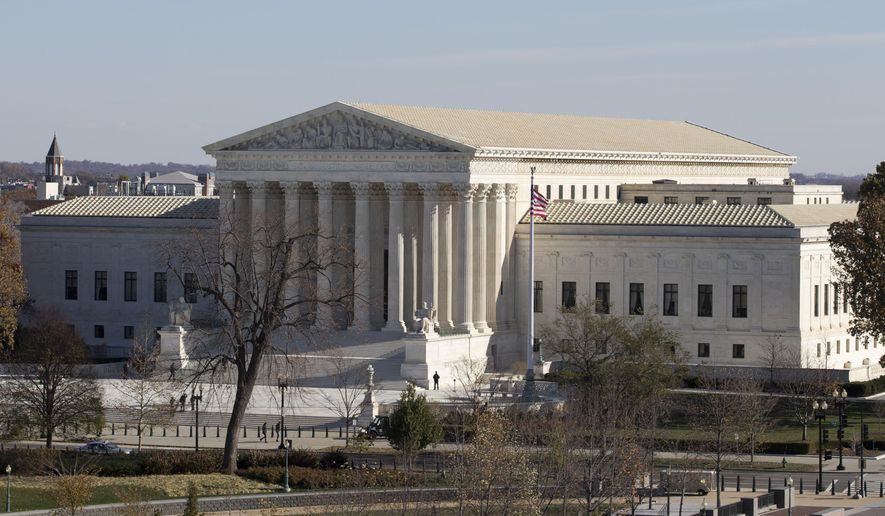OPINION:
The Supreme Court will soon decide one of the great issues of our time. Is same-sex marriage protected by the U.S. Constitution? Most federal courts have said that it is. But last November, the U.S. Court of Appeals for the Sixth Circuit said ’no.’ They said the issue of same-sex marriage belongs to the states. Their decision created a conflict within the federal circuit courts which convinced the Supreme Court that they will have to decide the issue.
When the Supreme Court announced their decision to hear the case, they asked the opposing parties to argue two important questions. First, “Does the Fourteenth Amendment require a state to license a marriage between two people of the same sex?” and second “Does the Fourteenth Amendment require a state to recognize a marriage between two people of the same sex when their marriage was lawfully licensed and performed out-of-state?” These are the questions the Supreme Court will decide. A decision is expected in June.
Most federal courts believe that the word “liberty” in the Due Process Clause in the Fourteenth Amendment protects same-sex marriage. The key word is “liberty.” They base their interpretation on recent Supreme Court decisions. For example, in 2003, the Supreme Court struck down a Texas law prohibiting homosexual sex because of the word “liberty.” Many of the so-called rights extended to homosexuals are based on the theory that homosexuality is a “liberty” right protected by the Fourteenth Amendment.
However, there is a serious problem with this claim. The Nineteenth Amendment suggests that the word “liberty” in the Fourteenth Amendment could not possibly refer to same-sex marriage or homosexual sex. In fact, it strongly suggests that the courts have twisted this word to conflict with its historic interpretation.
If the word “liberty” can be interpreted to include same-sex marriage, then surely it must protect other rights as well. If the word “liberty” protects same-sex marriage, then it is legitimate to ask why it hasn’t been previously interpreted to protect other rights we consider important.
Among those would be the right of women to vote. The right of women to vote was not protected by the Constitution until 1920 with the passage of the Nineteenth Amendment. Sadly, when the Constitution was written, it did not include the right of women to vote. Obviously, this was a great injustice. None the less, the Supreme Court in 1920 did not believe that the word “liberty” in the Fourteenth Amendment protected a woman’s right to vote, a right that we consider basic today.
Former Supreme Courts did not automatically look for ways to use the language in the Constitution to invent a right it was not meant to cover. Instead, We the People amended the Constitution to bring about change. The supporters of women’s suffrage knew that an amendment had to be passed to give them the vote. That understanding resulted in the ratification of the Nineteenth Amendment in 1920.
What is important to notice is what did not happen in 1920. The Supreme Court did not use the word “liberty” in the Fourteenth Amendment to invent a new right. The Supreme Court could not invent a right for women to vote. No matter how unjust it was to deny women the vote, an amendment to the Constitution had to be passed before it could change. Therefore, if we want same-sex marriage to be a constitutional right, We the People must pass an amendment to make it so. The Supreme Court cannot invent the right out of thin air.
If the Supreme Court’s interpretation of the word “liberty” in the Fourteenth Amendment is correct then all the work that went to the ratify the Nineteenth Amendment was unnecessary. The Supreme Court could simply have ruled that the word “liberty” included a woman’s right to vote. Indeed, in 1873, Susan B. Anthony made this argument, asking “Is it a Crime for a U.S. Citizen to Vote?” She argued that women have a right to vote based upon the Privileges and Immunities Clause in the Fourteenth Amendment. In 1873, Susan B. Anthony was convicted of the crime of voting. The judge in her case was Associate Justice of the U.S. Supreme Court Ward Hunt. The Nineteenth Amendment had to be ratified because the Supreme Court in 1920 would not manipulate the word “liberty” the way our courts do today. This fact strongly suggests that same-sex marriage is not a constitutional right.
Finally, in our system of government the way a decision is made is just as important as the decision itself. The Supreme Court will seriously undermine the Constitution if they continue to manipulate its words in order to promote a lifestyle they politically support.
David W. New is a member of the Washington, D.C. and Maryland Bars. He
is the author of “The Constitution for Beginners.”




Please read our comment policy before commenting.